|

Bhutto widower 'rejects PM role'
The widower of assassinated Pakistani politician Benazir Bhutto has
ruled himself out as prime minister, despite his party's success at the
election.
Asif Ali Zardari said his PPP party would choose another candidate to
lead a coalition government that opposition parties are expected to
form.
|
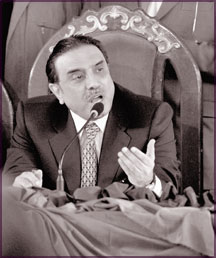
Asif Ali Zardari |
President Pervez Musharraf has called for reconciliation after his
party's defeat, but he ruled out stepping down.
He said the polls had strengthened moderate forces inside the
country.
Mr Zardari, a deeply divisive figure in Pakistani politics who has
spent several years in prison on corruption charges, is not an MP and is
therefore not currently eligible to serve as prime minister.
But there had been speculation that he might enter parliament via a
by-election. He was speaking as negotiations between the PPP and the
other main opposition party, ex-Prime Minister Nawaz Sharif's Pakistani
Muslim League-Nawaz (PML-N), intensified.
The main party backing President Musharraf suffered a heavy defeat,
and correspondents say the president appears to be in a very difficult
position.
If a new governing coalition manages to muster a two-thirds majority
in parliament, it could call for Mr Musharraf to be impeached.
Mr Zardari told reporters in Peshawar that his party could work with
the MQM, a Sindh-based regional party which supports Mr Musharraf.
'Moderates boosted'
Mr Sharif has urged Mr Musharraf to resign, and a PPP statement cited
alleged remarks by the president that he would step down if the parties
supporting him were defeated in elections.
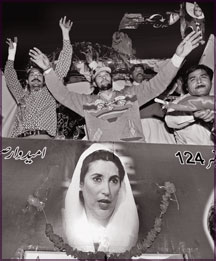
But Mr Musharraf said that he would try to work with any new
government. "The president emphasised the need for harmonious coalition
in the interest of peaceful governance, development and progress of
Pakistan," he said in a statement released by the foreign ministry.
"The elections have strengthened the moderate forces in the country."
In an earlier interview for the US newspaper the Wall Street Journal,
Mr Musharraf said he would not resign or retire. He was re-elected to
the presidency last October, in a parliamentary vote boycotted by the
opposition as unconstitutional.
He has been a major US ally in the "war on terror" but his popularity
has waned at home amid accusations of authoritarianism and incompetence.
Alliance not guaranteed
Mr Zardari earlier said his party would "form a government of
national consensus which will take along every democratic force".
Perhaps Musharraf should leave Pakistan so that reforms can begin.
For now, the decision of the party is that we are not interested in
any of those people who are part and parcel of the last government," he
said, seemingly ruling out any coalition with the Pakistan Muslim
League's pro-Musharraf wing, the PML-Q.
With votes counted in 258 out of 272 constituencies, the PPP has won
87 seats, according to the Election Commission of Pakistan.
The PML-N is in second place with 66 seats so far. Mr Sharif has said
is prepared to discuss joining a coalition with Mr Zardari's party in
order "to rid Pakistan of dictatorship forever".
But the BBC's Chris Morris in Islamabad says that, while a coalition
between the two is the most likely option, there are certainly issues on
which they disagree and there are no guarantees an alliance will emerge.
BBC
Musharraf hopes to avoid clash with PM
by Masood Haider
NEW YORK, Feb 20: President Pervez Musharraf warned on Wednesday that
any clash between himself and the next prime minister would undermine
democracy, saying "the clash will be if the prime minister and president
will be trying to get rid of each other. I only hope we avoid these
clashes."
In his first interview to a US paper after the parliamentary
elections, Mr Musharraf told the Wall Street Journal he did not plan to
step down.
Instead, he said, he wanted to help end internecine battles between
presidents and prime ministers that have marred country's political
history and precipitated military interference in the government.
President Musharraf, the paper said, intended to stay in office to
guide Pakistan's democratic transition - even if it meant working with a
man he believed once tried to kill him.
"We have to move forward in a way that we bring about a stable
democratic government to Pakistan," said Mr Musharraf.
The newspaper observed that "the strongman who brooked little
opposition in the years after his 1999 coup now stands in a delicate
spot, rejected by his own people and facing a government likely to be
led by a party with reasons to despise him. He is seeking to hang on to
power, even as his political base crumbles."
Mr Musharraf asserted in the interview that "Pakistan now has the
checks and balances in place to prevent any politician -- or the army -
from usurping power.
"The prime minister runs the government. The president has his own
position, but has no authority running the government," he said.
The newspaper said that "one debate is already flaring up: whether to
restore an independent judiciary, which could produce a Supreme Court
that would call into doubt the legitimacy of Mr Musharraf's re-election
as president last year."
Asked to comment on the demand of PML-N leader Nawaz Sharif to
reinstate the judges he had removed, Mr Musharraf said that calling back
the former chief justice and other top judges wasn't a possibility.
Dawn, Pakistan
Ohio no easy ride for Clinton
by Louisa Brooke, Columbus, Ohio
Hillary Clinton is battling to survive in the race for the Democratic
nomination after Barack Obama's winning streak since Super Tuesday.
Mr Obama has won 10 contests out of 10, and is pulling well ahead in
the delegate stakes.

But Mrs Clinton could bounce back in two weeks with the primaries in
Ohio and Texas, where a total of 334 delegates are up for grabs.
It has been described as her last stand.
"If she loses either Texas or Ohio, this thing is done," says James
Carville, a former chief strategist to her husband Bill.
Mrs Clinton spent Tuesday campaigning in Ohio as Mr Obama swept to
victory in Wisconsin, and was addressing a rally in the rust-belt city
of Youngstown when most US networks cut away to her rival's victory
speech.
"Conventional wisdom says that Ohio is Hillary's to lose," says
veteran political analyst Todd Kleismit of the Ohio Historical Society.
"It's a declining manufacturing state with a base of Democratic
supporters who are lower-income workers and union members fond of
recalling the boom economy of the 1990s when Bill Clinton was in
office," he says.
Passion
Immediately after Super Tuesday, he thought the conventional wisdom
was correct - the race would be close, but Clinton would win.
Now he says it is "anybody's to win".
Recent polls in Ohio are still encouraging for Mrs Clinton - more so
than in Texas. SurveyUSA this week put support for her at 52%, compared
to 43% for Mr Obama, with 1% undecided.
A week ago, a Rasmussen Reports poll put her on 51%, and Mr Obama on
37%, with 12% undecided.
But on the ground, you meet plenty of voters who are inspired by Mr
Obama.
In the small town of Delaware, on a sunny February morning shoppers
mingle in the local bookstore on the high street.
Democratic party activist Susan Powell clutches the last copy of
Barack Obama's book The Audacity of Hope.
She says she is a passionate supporter of the Illinois senator.
Her husband is equally supportive. "I remember John F Kennedy and his
energy," Tony Marconi says, his eyes bright with enthusiasm. "I haven't
felt this much hope for a long time."
Tony's next comment may be dispiriting for Clinton's campaign team.
He has served as a precinct captain in Ohio for the Democratic Party,
and plans to actively campaign for Obama ahead of the primary.
But he is not enthused by Clinton's candidacy. "If Clinton is the
nominee, I'll vote for her in November but I won't be out campaigning,"
he warns.
'Time for a woman'
He is not the only Democrat who is unsure about Hillary Clinton.
At Ohio State University in Columbus student Matt Toothman manages
the large SBX bookstore opposite the campus.
"A lot of guys are put off by her, because she's very outspoken and I
think she's calculating, whereas Obama is more real," he says.
Women make up one of Mrs Clinton's core constituencies and student
Kelly Bradbury says she will probably vote for her "because she's a
woman and its time for a female president".
But she adds that she likes Mr Obama too, and her friend Ann Ferrell
falls squarely into the Obama camp.
"I saw him speak in Kentucky and he's exciting. He feels like change,
his energy is great," Ann says.
Then there are those like bus driver Arnez Manigoe who likes both
candidates. He's waiting to start his evening shift in central Columbus
and loves to discuss politics. Petrol prices
Getting out of Iraq is Arnez's primary concern and he wants a
candidate who will bring troops home.
"American young men are losing their lives for nothing," is his view
of the war. Ohio has one of the highest numbers of troop deaths in
America.
But the lacklustre economy is not far from his thoughts either. He
says his friends are feeling the pinch as petrol prices rise in a state
that is already struggling with one of the highest unemployment rates in
the country.
He does not expect to decide who to vote for until he is at the
ballot box. Lower-income groups and women have up to now been the
bedrock of Hillary Clinton's support.
But in the latest primaries, they have begun to look less solid.
"I don't see any reason why the pattern developed in Maryland,
Virginia and Wisconsin - of Obama being able to cut into the base of
Hillary Clinton's vote - will stop when you get to Ohio," says Professor
John Kessel, Emeritus Professor of Political Science at Ohio State
University.
In his view, Barack Obama will "do very well" in the state on 4
March.
BBC
Serbia recalls ambassador from US
Kosovo - the newest nation?:
Serbia has recalled its ambassador from Washington in protest at US
recognition of Kosovo's independence, saying the US has "violated
international law".
Prime Minister Vojislav Kostunica also threatened to withdraw envoys
from other countries which recognised the territory's secession from
Serbia.
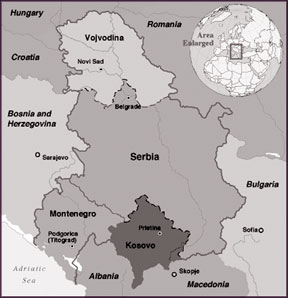
Mr Kostunica said the envoy's recall was Serbia's "first urgent
measure". France, the UK, Germany and Italy have all recognised the new
state following its declaration of independence.
In New York, Serbian President Boris Tadic made an impassioned appeal
to the UN Security Council to reject Kosovo's declaration.
But the Council remained deadlocked over how to respond to Kosovo's
declaration of independence, although Russia and China supported
President Tadic, and the UN body failed to agree on any action.
Serbia has a powerful ally in Russia, the BBC's Jane Little reports
from the UN, but other permanent members of the council - including the
US, Britain and France - insist independence is legal and the only
viable way forward. With a council so divided, it is unlikely any
resolution could pass in favour of Serbia or Kosovo, our correspondent
says.
The leading European states which endorsed independence did so after
a meeting of EU foreign ministers in Brussels in which it was agreed
that Kosovo should not set a precedent for other states. Spain and
several other member states have withheld recognition because of
concerns about separatist movements within their own borders.
'Non-existent state'
Serbian media report that Belgrade's ambassadors to all states which
recognise Kosovo's independence are being ordered home.
The Associated Press news agency quotes the foreign ministry as
saying Serbia's envoys to France and Turkey have been withdrawn for
"consultation until further notice".
|

SERBIA : Students hold the Serbian flag during a protest in Nis, 200km
south of Belgrade, on February 20, 2008. NATO peacekeepers
sealed for 24 hours two Kosovo border crossings with Serbia
at Banja and Jarinje after at least 1,000 Serbs from Kosovo
and Serbia ransacked and torched both sites two days after
Kosovo's declaration of independence. The February 19, 2008,
arson was the most violent reaction to the unilateral break
from Belgrade in Kosovo which has been formally recognized
by the United States and major European powers .- AFP |
President Tadic told the UN Security Council there were "dozens of
various Kosovos in the world and all of them lie in wait for Kosovo's
act of secession to... be established as an acceptable norm".
"If you cast a blind eye to this illegal act, who guarantees to you
that parts of your countries will not declare independence in the same
illegal way?" he asked. Serbia's interior ministry has filed criminal
charges against Kosovo Albanian leaders instrumental in proclaiming
independence, accusing them of proclaiming a "false state" on Serbian
territory.
In Belgrade, about 10,000 students marched in protest at the
independence declaration, and Serb enclaves inside Kosovo also saw
anti-independence rallies.
Serbian security forces were driven out of Kosovo in 1999 after a
Nato bombing campaign aimed at halting the violent repression of ethnic
Albanian separatists.
The province has been under UN administration and Nato protection
since then.
Pledges of support
On Monday, Washington formally recognised Kosovo as a "sovereign and
independent state". In Brussels, EU foreign ministers adopted a
compromise proposal from Spain, one of several countries which argue
that Kosovo's independence is a breach of international law and will
boost separatists everywhere.
The bloc set aside differences by stressing Kosovo's declaration was
not a precedent for separatists elsewhere and pledging that the whole
Balkan region would eventually join the bloc. Unanimous recognition of
Kosovo was never at stake at the meeting because the EU has no legal
right to recognise new states, BBC European affairs correspondent Oana
Lungescu notes.
The question was whether, despite their differences on recognition,
Europeans could unite on how to bring stability in their backyard, after
almost two decades of seemingly endless Balkan crises.
This is an ugly victory for demographic warfare
It took hours of tortuous negotiations but the EU managed to pass the
unity test, our correspondent says.
Kosovo, the ministers agreed, was a unique case and did not call into
question international legal principles, such as territorial integrity.
The bloc's statement said the EU was ready to play a leading role in
the Balkans, with a 2,000-strong police and justice mission headed to
Kosovo and new measures to promote economic and political development in
the region, including a donors' conference by June.
The EU foreign affairs chief Javier Solana said there was a total
commitment to bring all the Balkan countries into the EU.
But Kosovo will not be able to get very close until it is recognised
by all 27 members, and that may take a long time, our correspondent
adds.
Among other countries to recognise Kosovo was Turkey.
Correspondents say this has symbolic significance because for
centuries the Ottoman Turks ruled the Balkans, including modern-day
Serbia and Kosovo.
BBC
'Iraq's new justice law will not help us'
by Basil Adas, Correspondent
Baghdad: Despite the new accountability and justice law many
Baathists in Iraq's southern Shiite provinces are not optimistic about
the new legislation. Its introduction has been heralded by some as a
move which will enable thousands of Baathists to return to government
jobs.
However, there are major difficulties in its implementation in cities
inhabited by Shiite majorities which is controlled by hardline religious
parties, Iraqi citizens said.
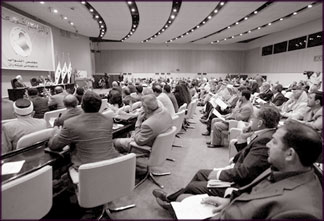
"It is impossible to implement this law in my province, Mayssan,
because I am a former Baathist and part of a government office where
more than 100 of its staff are members of the Dawa Party, led by Nouri
Al Maliki, and the Supreme Islamic Council, led by Abdul Aziz Al Hakim.
That means it is impossible for me to return to my job because the
accountability and justice law will not be implemented thus my only
choice is to take a pension salary. Although I am 40 years old and was
not a high-ranking Baathist nor in a special security service in
Saddam's era", Ganem Hussain told Gulf News.
"I work in a food canning factory in Naja. I went to the factory
department and they told me that I was a fighter of the so-called
glorious day volunteers during the rule of Saddam Hussain and the
province council has issued a resolution preventing Baathists affiliated
to the glorious army to return to their jobs despite the accountability
and justice law," Baathist supporter Moa'aed Al Quraishi told Gulf News.
According to human rights organisations in Baghdad more than 100,000
Baathists were sacked in the Shiite southern governorates and the same
number left their jobs due to harassment and threats.
"I am an employee in Basra governorate and was a normal Baathist and
I decided to leave my job because the place I worked at was taken over
by a political party thus the accountability and justice law cannot
secure a genuine and legal return to any Baathist to his work," Yassin
Al Tayar told Gulf News.
The religious and political parties allied in the Iraqi government
dominate nine southern province councils in Mayssan, Thiqar, Basra,
Najaf, Karbala, Qadisiyah, Babil, Muthana and Wassit. This, to many
Iraqis, makes it impossible to implement the new law.
Fatima, a school manager in Wassit, told Gulf News: "I am a Baathist
and although I worked in the education field during Saddam's era, I was
fired from my job more than three years ago.
Now after issuing the accountability and justice law which is less
stringent than the uprooting law, I am not optimistic because the
school's manager is affiliated to the Al Hakim Islamic Supreme Council;
therefore it is impossible to return to my work and ask the manager to
leave her position."
Gulfnews, U.A.E
'Murder, racism and cover-ups'- Mohamed Al Fayed
How a murder plot of ferocious complexity involving a cast of
thousands, from that prominent Nazi the Duke of Edinburgh to a
photographer's dog, could swing into action in the space of an hour was
yesterday's great unanswered question.
After nearly five months and nearly 150 witnesses it was finally the
turn of Mohamed Al Fayed to give evidence at the inquests of his son,
Dodi, and Diana, Princess of Wales. During a day in the witness box he
implicated the entire British and French Establishments with the sole
exception of the Queen, whom he regarded as an unimportant figure.
|
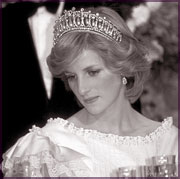
Princess Diana |
What he lacked was evidence. It all lay in the files of MI6, he said
repeatedly, and he was prevented by a steel wall from getting at it.
Having taken the oath in the name of Allah, he surprised the crowded
court immediately. "I make no allegations," he said.
He then spent the rest of the day making them, beginning with the
Duke of Edinburgh, who, he alleges, was the mastermind behind the
conspiracy to murder the Princess and Dodi.
The Prince of Wales had also participated in the plot, Mr Al Fayed
claimed. Ian Burnett, QC, for the coroner, asked him if anyone else in
the Royal Family had taken part. "They are the main two. I don't think
the Queen is important.
The Duke of Edinburgh runs the country behind the scenes; he is the
actual head of the Royal Family. He's a racist; he grew up with Nazis,"
Mr Al Fayed maintained, adding for good measure that one of the Duke's
aunts had married one of Hitler's generals.
"And beneath the surface he has a German name - Frankenstein. Well,
it sounds like Frankenstein." The Duke is a member of the Danish-German
aristocratic House of Schleswig-Holstein-Sonderburg-Glcksburg.
As a former sponsor of the Royal Windsor Horse Show, Mr Al Fayed said
that he had enjoyed good relations with the Royal Family before the
crash. "I even gave a dinner for Prince Philip and his Nazi German
relatives. Now I am insulted, humiliated."
He began to read from a typed script, the thrust of which was that
Lords Condon and Stevens of Kirkwhelpington, successive Metropolitan
Police commissioners, had failed immediately to give the previous
coroner a note written by the Princess expressing fears for her safety.
He failed to say that the note had been handed to the present coroner
when the inquest finally opened.
Lord Stevens, who prepared an 800-page report on the deaths,
concluding that they were the result of an accident, had been corrupted
and blackmailed into drawing that conclusion, and the report had been
written with the help of MI6. Lord Stevens had also cleared Harrods out
of its entire stock of caviar.
"You are here to give evidence, and not to argue a case or give
speeches," Mr Burnett cautioned the witness. Showing immense restraint
Lord Justice Scott Baker, the coroner, allowed Mr Al Fayed to finish
reading his note to the jury.
The list of participants in the conspiracy lengthened by the minute.
Timesonline, UK |
